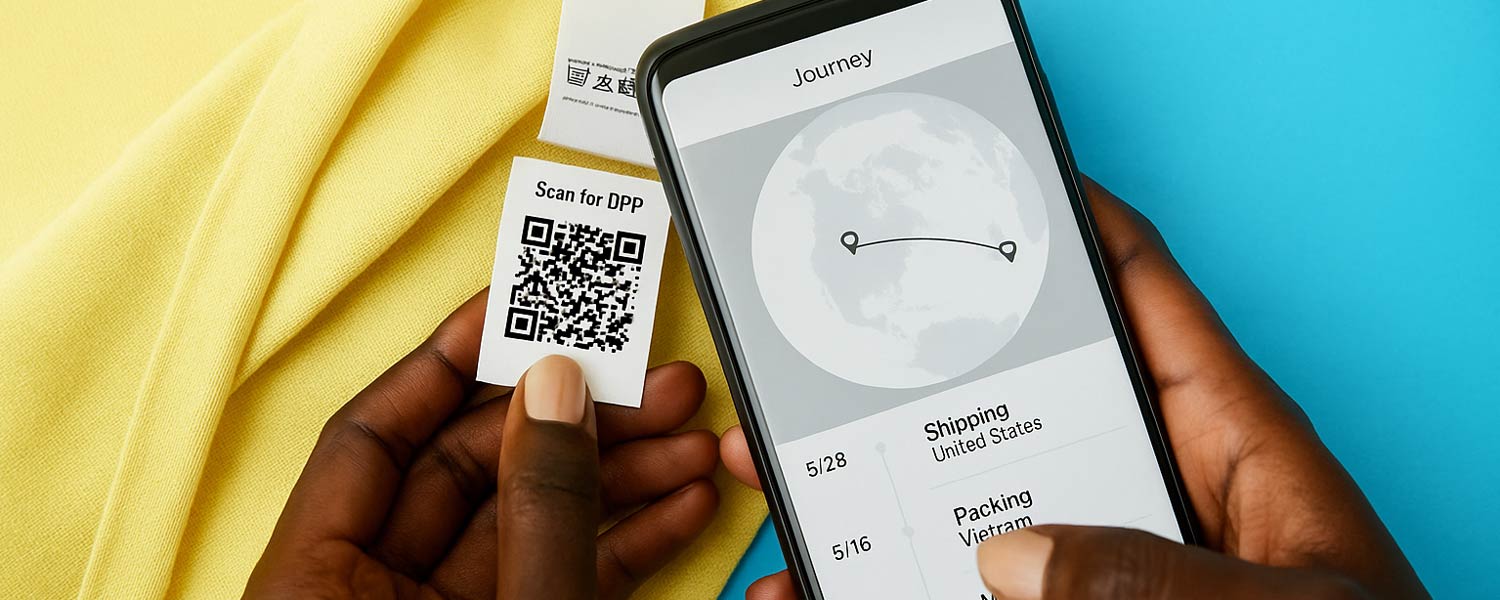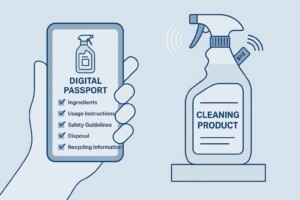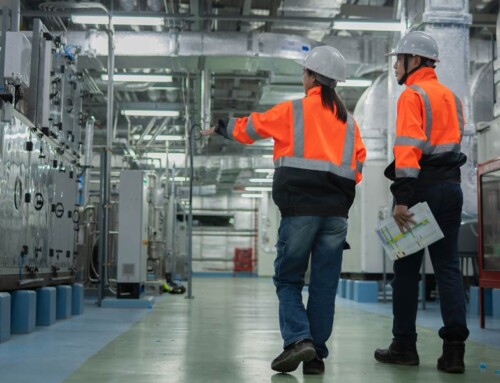Digital Product Passports: An ID Card Unlocking the Future of the Cleaning Industry

On a recent trip to Europe, I participated in a series of discussions on the future of Professional Cleaning.
We discussed the need for industry-specific certifications that were globally recognized and helped workers gain the skills needed to utilize new technologies. We discussed AI-driven platforms and tools like ChatGPT that streamline training processes by providing real-time assistance to cleaning staff, delivering tailored content, and simulating real-life scenarios for practical “adults-learn-by-doing” training.
But what caught my attention was our discussion that the cleaning industry is undergoing a transformative shift driven by the need for transparency, sustainability, and efficiency. I described how ISSA facilitates Community of Practice Forums, dynamic spaces for professionals to share best practices, collaborate, and generate new knowledge.
My European colleagues described their excitement for Digital Product Passports (DPPs). An ID Card is a revolutionary tool that redefines how products are manufactured, distributed, used, and recycled.
What are digital product passports?
DPPs will provide a way to track product details, including materials, production, and lifecycle. From raw material sourcing to end-of-life disposal, DPPs will provide stakeholders real-time data on a product’s composition, environmental impact, usage guidelines, and much more. Accessible via product labels with QR codes, NFC tags, or other digital interfaces, DPPs will empower every participant in the value chain to make informed decisions.
DPPs and the cleaning industry value chain
- Manufacturers
For manufacturers of cleaning products, tools, and equipment, DPPs will offer an unprecedented level of transparency. By detailing ingredient lists, sourcing information, and environmental impact metrics, manufacturers can showcase their commitment to sustainability and compliance.
- Distributors
Distributors play a pivotal role in ensuring that products reach end-users efficiently. With DPPs, distributors can streamline supply chains by accessing real-time data on product specifications, storage requirements, and transportation guidelines, leading to optimized logistics and reduced waste.
- Facility managers
Facility managers are tasked with procurement decisions, managing budgets, and maintaining cleanliness standards while adhering to safety and environmental regulations. DPPs will help decision-making by providing information on product usage, safety protocols, and disposal methods, enabling more informed procurement and usage decisions.
- Cleaning companies:
Cleaning service providers can leverage DPPs to train staff effectively, ensure the correct usage of products, and demonstrate compliance with cleaning and environmental standards to clients. This transparency can serve as a competitive advantage in a market increasingly focused on sustainability and workforce well-being.
- Cleaning workers:
At the frontline, cleaning workers benefit immensely from DPPs. Easy access to product information ensures proper usage, adherence to safety protocols, and a deeper understanding of the hazards and risks to their health and the environmental impact of their work. This empowerment through information will provide solutions that lead to safer workplaces and more effective cleaning practices.
Real-world applications: DPPs in action
The implementation of DPPs is not just theoretical; at our meetings, several companies described how they have already begun to harness their potential:
- A leading flooring manufacturer integrated DPPs to track product sustainability and supply chain transparency. This initiative streamlined their compliance processes and reinforced their brand’s commitment to environmental responsibility.
- A global manufacturer described how DPPs on their products provided customers with insights into their product’s journey, from sourcing to production details, enhancing transparency and customer engagement.
- A professional sports stadium demonstrated the use of DPPs in tracking the recycling process of plastic bottle caps into new products, showcasing the potential of DPPs in promoting circular economies and a shift from the traditional linear model of “take-make-waste” to a regenerative one.
Here’s how DPPs are relevant to the cleaning industry:
- Transparency and Trust: DPPS will show where products come from, what they’re made of, and how they can be reused or recycled. They provide access to detailed product information, fostering trust and informed decision-making.
- Compliance with regulations: DPPs can help businesses comply with regulations related to product safety, storage, use, disposal, and sustainability,
- Material Sourcing and Waste Reduction: DPPs facilitate the tracking of raw materials and their origins, helping to ensure ethical and sustainable sourcing practices.
- Operational efficiency: Streamlining access to product data will reduce administrative burdens and enhance procurement and supply chain coordination.
Examples of how DPPs will be used in the cleaning industry:
- Cleaning products: DPPs will be used to find information about cleaning products’ ingredients and chemical composition. They will provide instant access to information to help make informed decisions on using them safely and effectively.
- Cleaning cloths and equipment: DPPs will track the materials, durability, and recyclability. They will help inform decisions on using, maintaining, cleaning, reducing waste, and facilitating circular business models. A facility may choose reusable microfiber cloths with a longer lifecycle and lower carbon footprint, verified by the DPP.
- Workwear and protective clothing: DPPs can provide information about the materials, production methods, chemical resistance ratings, thermal protection, and standards compliance. A DPP on a pair of gloves might reveal it resists sodium hypochlorite and quaternary ammonium compounds and helps make informed decisions when using disinfectants.
- Enhanced training and awareness: DPPs can integrate training materials that are accessible via QR codes on product labels. Workers can verify in real-time that their gloves, masks, eye protection, and protective clothing are appropriate for the chemicals and tasks at hand. Workers can access videos on how to wear and remove PPE safely, visual guides on how to use products to clean, and links to safety data sheets.
The future is Digital Product Passports
As the cleaning industry continues to evolve, integrating Digital Product Passports is a pivotal advancement. All you will need is a cell phone. DPPs will turn every product, tool, and equipment into an interactive learning opportunity. DPPs are a tool for the cleaning industry across the entire value chain to unlock new efficiency, safety, sustainability, and transparency levels. For me, that was one incredible trip to Europe.
Dr. Gavin Macgregor-Skinner is a university professor and senior director at ISSA and manages the Making Safer Choices program, developing collaborative partnerships with members, universities, and ISSA.



















